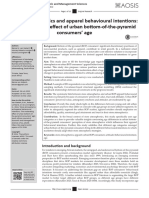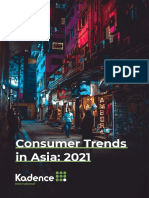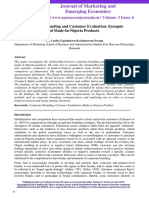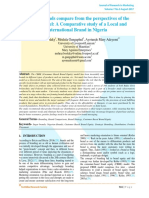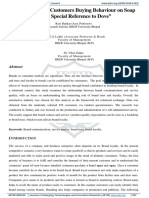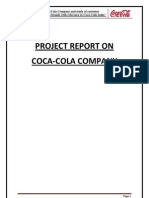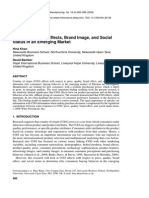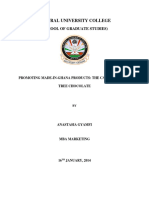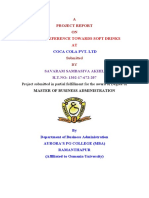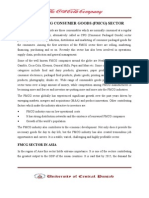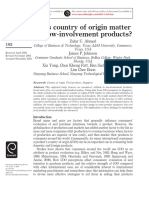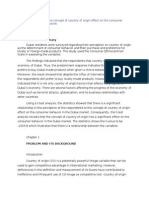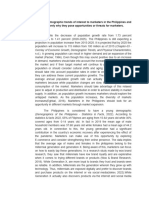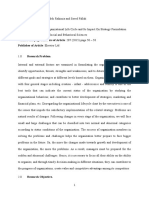Professional Documents
Culture Documents
Zambian Consumers and The Country-of-Origin Effect
Zambian Consumers and The Country-of-Origin Effect
Original Title
Copyright
Available Formats
Share this document
Did you find this document useful?
Is this content inappropriate?
Report this DocumentCopyright:
Available Formats
Zambian Consumers and The Country-of-Origin Effect
Zambian Consumers and The Country-of-Origin Effect
Copyright:
Available Formats
Volume 9, Issue 4, April – 2024 International Journal of Innovative Science and Research Technology
ISSN No:-2456-2165 https://doi.org/10.38124/ijisrt/IJISRT24APR885
Zambian Consumers and the Country-of-Origin Effect
Samuel Phiri
Tianjin Normal University,
School of Management Tianjin, China
Abstract:- Since increase in exportsis highlybeneficial I. INTRODUCTION
for the economic development and growth of a country,
this research exposes the negative effects of a brand’s The topic of country-of-origin and purchase intention
country-of-origin on consumer purchase intention in is one in the marketing research circles that has widely
developing countries, it exposes how a brand’s country- received attention from researchers over a span of many
of-origin in developing countries influences local decades. Whether in recent or older studies, the two
consumers to purchase imported brands more than local concepts; country-of-origin (COO) and purchase intention
brands. (PI) in various marketing literature can be evidently seen as
studied individually or paired together (Rusmiati&Sugiati,
Through the use of a quantitative research method, 2020) or studied together with other concepts in marketing
this research is based on data collected from a sample to determine their role in consumer behavior (Vuong& Giao,
size of 600 that was analyzed in SPSS. The findings 2020).
shows that country-of-origin influences the purchase of
local and imported FMCGs in Zambia, but its effects are This study was limited to study of fast-moving
much stronger towards the purchase of imported goods consumer goods because current studies indicate that the
than local goods. Furthermore, the results also reveal fast-moving consumer goods (FMCG) sector contributes
that Zambians are prone to purchase imported goods significantly to the gross domestic product (GDP) growth of
because they trust them. These findings therefore a country (Makaleng & Hove-Sibanda,2022). Other studies
provide empirical evidence of the importance of the need also have shown that), coca cola was ranked the top leading
for more studies and usage of country-of-origin and fast-moving consumer good (FMCG) brand worldwide for
brand trust in marketing research and practice in the year 2021, by household reach (Statista, 2021) and has
developing countries. been estimated to hold about 29% market share of
carbonated soft drinks in the middle east and Africa
Keywords:- Country-of-Origin, Brand Trust, Purchase combined (Wood & Baker, 2021). Furthermore, according
Intention, FMCGs, Developing Countries. to a survey done in the year 2022 in Zambia (Statista,2022),
data from the survey showed that Coca Cola was the most
preferred brand of carbonated drinks, with a share of 75% of
respondents saying they preferred Coca Cola while the
remaining 25% was left to be shared among other brands,
among them Pepsi with 17%, also another Imported brand.
Such data tells us that there’s definite need for reforms that
are aimed at changing the Zambian consumer’s attitude
towards purchasing global brands over local brands. Thus,
this research as aimed to investigate Zambian consumers’
attitude towards purchasing a local brand called Redrock
cola verses an imported brand, Coca cola.
Fig 1: Left is Redrock Cola and Right is Coca Cola
IJISRT24APR885 www.ijisrt.com 585
Volume 9, Issue 4, April – 2024 International Journal of Innovative Science and Research Technology
ISSN No:-2456-2165 https://doi.org/10.38124/ijisrt/IJISRT24APR885
According to previous literature, one of the many ways couldinfluence the increase in the purchase of local brands
in which marketing research in developed countries differs over imported ones.
from that of developing countries is in consumer behavior
(Shankar & Carpenter, 2012). (Craig & Douglas, 2005) The Zambian economy stands to benefit significantly
stated that in developing countries, consumer behavior may from a robust understanding of consumer behavior, as it can
be more influenced by factors such as lower income levels, inform strategic initiatives aimed at bolstering local
diverse cultural norms, and evolving market preferences due industries, fostering economic growth, and mitigating
to rapid economic growth and urbanization. These factors unemployment through the creation of job opportunities
are not only likely to affect a developing country’s within the thriving local manufacturing sector. This research
consumer behavior, but also likely to cause differences in seeks to leverage the constructs of country-of-origin (COO),
the approach and occurrence of marketing research on brand trust (BT) and purchase intention (PI) to unravel the
particular topics in these emerging economies. Based on intricate web of factors that influence consumer purchasing
such research information, it is worth to consider the fact decisions in Zambia. By doing so, it aims to not only shed
that in developing countries there exists gaps in marketing light on the underlying drivers of consumer behavior but
research or to be more specific as it relates to this paper, also to provide actionable insights that can inform targeted
there exists gaps in consumer behavior research in marketing strategies and policy interventions to bolster the
developing countries, thus there’s need for more marketing Zambian economy.
research based on these countries.
This research aims at Investigating the specific factors
Apart from prior literature showing that developing that contribute to the negative effects of country-of-origin
countries have been understudied, the growth of African (COO) on the purchasing behavior of Zambian consumers,
GDP and consumer spending is also one of the current calls particularly in relation to imported brands versus local
for the need for marketing-based research on emerging brands. This includes examining the perceptions and
economies. Burgess and Malhotra in their 2020 research attitudes of consumers towards products based on their
paper (Burgess & Malhotra, 2020) stated that African GDP country of origin, such as how cultural, and economic
and consumer spending is projected to double in this decade, factors influence consumer preferences.
reaching 2.6 USD trillion and 1.4 USD trillion, respectively.
Consequently, more than one-third of the Africa’s 3 billion Lastly, this research aims to provide actionable insights
people could move from subsistence to more modern for marketers to tailor strategies that combat the negative
consumer lifestyles in the span of a generation. Also, a effects of country-of-origin on consumer purchasing
publication on Statista (statista.com) by (Tugba behavior, with the goal of promoting the growth of local
Sabanoglu,2023) shows that in 2015, consumer and brands and contributing to the overall development of the
businesses in Africa spent a total of four trillion U.S. dollars Zambian economy. This includes offering practical
and a projection for 2030 showed that this figure was recommendations for marketers to leverage consumer
projected to rise to around 6.6. billion U. S dollars by 2030, insights and cultural understanding to develop effective
fueled by population growth, urbanization and growing marketing strategies that resonate with Zambian consumers.
markets. It is worth noting that there’s a race to win these Additionally, the study aims to provide guidance on how
fast-growing, unsaturated markets by focusing attention on marketers can address cultural barriers and perceptions
the need to improve our understanding of marketing science related to local and imported products to promote the
and practice in African emergent contexts. It is to this extent success of local brands and industries. By addressing these
that, (Dadzie, Dadzie, and Winston, 2019) recently called detailed research objectives, the study aims to contribute to
for more research on drivers and performance outcomes of a deeper understanding of consumer behavior in the
marketing strategy and practice in African emerging markets. Zambian market, while also providing practical implications
for marketers and policymakers to support the growth of
Zambia, likemost of the other countries on the content local industries and the economy as a whole.
of Africa possesses gaps in marketing research. This paper
is aimed to play in role in changing the current state of II. LITERATURE REVIEW
marketing research in Zambia and Africa as whole by
shedding light on the impact of country-of-origin (COO) on A. Country-of-Country of Origin and Purchase Intention
purchase intention (PI). According to information gathered The subject of the Country-of-origin is one subjectin
through observation in Zambian marketing literature, this marketing research that has spiked the interest of many for
area of study has not yet been explored in Zambia. The over five decades now. From Schoolers first publication of
current state of study shows hints of the effect of country-of- its first study in 1965 (Schooler, 1965) which laid the
origin towards the purchase of goods in Zambia. (Mweemba foundation for understanding how the country of
& Mweshi,2022) and (Mweemba & Bbenkele,2022) in their manufacture can influence consumer attitudes and purchase
recent marketing research provided iterate evidence that intentions, up to the present day, country-of-origin has
Zambians are more inclined to purchase imported fast attracted a high level of interest from both scholars and
moving consumer goods than local fast moving consumer practitioners all over the world. Based on literature
goods.The aimof this article is to prove whether country-of- investigation, researchers found out that country-of-origin
origin has an impact on the purchase of local and imported image play a significant role in consumer’s perceptions
goods respectively. And as to help in finding factors that towards products and brands from any given country
IJISRT24APR885 www.ijisrt.com 586
Volume 9, Issue 4, April – 2024 International Journal of Innovative Science and Research Technology
ISSN No:-2456-2165 https://doi.org/10.38124/ijisrt/IJISRT24APR885
(Hanzaee & Khosrozadeh, 2011), already existing research H1: COO impacts the purchase of FMCGs in Zambia
shows that people care about which country the product H1a: Compared to local brands, Zambians are more
came from and where they were made (Parkvithee& likely to purchase imported brands
Miranda 2012). H1b: Compared to imported brands, Zambians are less
likely to purchase local brands
According (Kimery& McCord, 2002) in their 2002
research, measuring consumers’ buying behaviour is not The hypothesis H1 aim to investigate the influence of
fairly straightforward; hence, their buying behaviour is COO on Zambian consumers' purchase intentions, with H1a
typically assessed using purchase intention. The theoretical and H1b providing specific predictions regarding the
basis for purchase intention in marketing is a fundamental preference for global versus local brands.
concept in consumer behavior research. According to some
researchers, Consumer purchase intention refers to the B. Brand Trust and Purchase Intention
“possibility of consumers’ willingness of purchasing some Building and maintaining a trusting and long-lasting
specific products” (Dodds, Monroe & Grewal, 1991; relationship with customers are critical to a brand’s success
Yunus& Muhamad,2016). It is also usually defined as a in today’s highly competitive global market. And because of
prerequisite for stimulating and pushing consumers to its importance in the process of brand success, brand trust
actually purchase products and services (Zhuang & (BT) has drawn increasing attention from both practitioners
Luo,2021). Purchase intention, also according to some other and researchers in recent years (Vo & Nguyen, 2022).
researchers, refers to the likelihood that a buyer in a specific
purchase situation will choose a specific group of products Brand trust is defined as the degree of consumer
in the future (Le, 2021). It is also believed to be the willingness to trust the ability to perform the functions that
likelihood that consumers intend to purchase a specific the brand has stated (Nguyen & Dang,2022), it is the
brand in the future (Nguyen & Dang, 2022). consumers’ belief that they can trust a brand to provide the
same services or products as committed (UT-THA, (2021).
Understanding the influence of country-of-origin According to (Nosi and Pucci, 2021) Brand trust antecedents
(COO) on consumer behavior is a key area of interest in can be grouped into four categories: (1) cognition-based,
marketing research, particularly in the context of consumer which is connected with consumers’ perceptions (e.g.
goods purchasing behavior. This paper aims to delve into gathered information quality and perceived privacy
the impact of COO on consumer preferences and purchasing protection) related to the trusted party; (2) affect-based,
decisions in Zambia. Drawing from existing research which is linked to indirect interactions with the vendor such
evidence and hypotheses developed based on prior studies, as advice from relatable others; (3) experience-based, which
the focus will be on exploring the preference of Zambian is associated with consumers prior experience with the
consumers for global brands compared to local brands, and retailer and shopping in general; and (4) personality-
the implications of country-of-origin (COO) on their oriented, which is connected to individuals’ dispositional
purchase intentions. traits and shopping practice.
Numerous studies, including those by Elliot & Currently there exists many studies on brand trust that
Cameron (1994), Yunus& Rashid (2015), Rashid & Barnes have brought to light numerous, interesting research
(2016), and Hiena&Phuonga (2020), have highlighted the evidence that is worth consideration and attention by both
significant influence of COO on consumers’ intention to researchers and marketers. In recent research, some
purchase a particular product or brand. These studies have researchers have pointed out that many factors affect brand
demonstrated that consumers often associate certain trusts, such as experience and brand relationship (Budi,
attributes with products from specific countries, leading to 2021), perceived service quality (Vo & Nguyen, 2022),
preferences or biases in their purchasing behavior. Moreover, social media marketing (Puspaningrum, 2020), country-of-
research by (Moradi &Zarei, 2012) and (Hiena& origin (COO) (Vo & Nguyen, 2022), while other researchers
Phuonga,2020) has shed light on the preference for imported have stated the need for businesses to behave in their
goods in developing countries, citing not only high quality customers’ best interests based on common goals and values
but also the influence of country-of-origin (COO) on that reflect trust (Kholis&Ratnawati, 2021).
purchase decisions. These findings emphasize the role of
COO in shaping consumer preferences and purchasing In Zambia, current research on brandtrust highlights
behavior, particularly in emerging economies. Furthermore, the prevalence of imported carbonated soda brands in
recent research by (Mweemba &Mweshi, 2022) and Zambia, suggesting a clear preference for global players in
(Mweemba & Bbenkele, 2022) has provided empirical the market (Chiyesu and Chiboma, 2018). This preference is
evidence that Zambian consumers are more inclined to not solely attributed to the country-of-origin (COO) but is
purchase imported fast-moving consumer goods (FMCGs) also believed to be influenced by brand trust. Furthermore,
over local FMCGs. These findings indicate that COO plays existing literature also proves that there’s a positive
a significant role in shaping consumer preferences in the association between a product’s country-of-origin and
Zambian market, with a clear preference for global brands consumers’ trust in the product (Vo & Nguyen, 2022).
over local brands. Hence based on the existing literature, the Additionally, existing literature also proves that there’s a
following hypotheses have been formulated: positive association between brand trust and consumers’
IJISRT24APR885 www.ijisrt.com 587
Volume 9, Issue 4, April – 2024 International Journal of Innovative Science and Research Technology
ISSN No:-2456-2165 https://doi.org/10.38124/ijisrt/IJISRT24APR885
purchase intention (Cuong, 2020). Thus, the author of this significant role in their inclination to purchase global brands,
article proposed that: such as Coca Cola, over local alternatives. The hypothesis is
based on the premise that brand trust is a key factor
H2: Zambians Purchase Imported Brands due to their influencing consumer behavior and purchase decisions. By
Trust in them. examining the relationship between brand trust and the
purchasing of global brands in Zambia, this hypothesis aims
This hypothesis seeks to investigate and demonstrate to contribute to a deeper understanding of consumer
the positive impact of brand trust in mediating the causal behavior in the context of carbonated soda consumption in
effect of country-of-origin on the purchase of global brands the Zambian market.
in Zambia. It predicts that Zambians' trust in a brand plays a
Fig 2: Research Model
III. METHODOLOGY B. Scale
The entire survey comprised of questions that were
A. Survey Design tailored to question respondents about country-of-origin
The survey for this paper was designed to target (COO) i.e., examining the country-of-origin image of
Zambian consumers in Lusaka, the capital city of Zambia. Zambia for Redrock cola and the United States of America
Since this survey involves investigating the effect of for Coca cola, purchase intention (PI), and brand trust. All
country-of-origin on purchase of local brands and imported items in this survey were borrowed from previously done
brands respectively, it was decided that to avoid statistical research and measured on a 7-point Likert scale “1 = strong
error and bias there was need to design two questionnaires. disagree, 7 = strongly agree”. With regards to design for
The two questionnaires were all designed in google forms Country-of-origin (COO) items, the items used in this
and were sent to respondents in form of a link. To avoid the survey are those borrowed from (Parameswaran &Pisharodi,
same respondents from responding to both questionnaires, 1994; Hiena& Phuonga,2020), Purchase intention items
respondents were only exposed to either of the were borrowed from (Zhu & Benyoucef,2019; Hiena&
questionnaires. A respondent that participated in answering Phuonga,2020), while items for brand trust were borrowed
questionnaire 1 was not allowed to answer questionnaire 2 from (Dos Santos,2020; Vo & Nguyen, 2022). In order for
nor be exposed to it. This method allowed the author to the questionnaire to be specifically tailored for Zambian
collect data from a total of 600 respondents (i.e., 300 from respondents, some of the items were later modified to best
questionnaire 1 and 300 from questionnaire 2). fit Zambian respondents.
Table 1: Reliability Indicators of Constructs
Variables Code Cronbach’s Alpha if item deleted
Towards local brands
Country-of-origin (COO) (Cronbach’s Alpha = 0.715)
I believe Zambia is creative in production COOL1 .795
I believe Zambian technology is high COOL2 .783
I believe Zambian designs are beautiful COOL3 .794
I believe Zambia has highly qualified workers COOL4 .810
I believe Zambian workers have creative skills COOL5 .796
I believe Zambia is a prestigious country COOL6 .781
I believe Zambia is an advanced country COOL7 .788
Purchase intention (PI) (Cronbach’s Alpha = 0.978)
Next time I want to buy carbonated soda I intend to purchase Redrock cola PI1 .765
Next time I want to buy carbonated soda I plan to purchase Redrock cola PI2 .765
Next time I want to buy carbonated soda I will try to purchase Redrock cola PI3 .764
IJISRT24APR885 www.ijisrt.com 588
Volume 9, Issue 4, April – 2024 International Journal of Innovative Science and Research Technology
ISSN No:-2456-2165 https://doi.org/10.38124/ijisrt/IJISRT24APR885
Next time I want to buy carbonated soda I expect to purchase Redrock cola PI4 .763
Towards Imported brands
Country-of-origin (COO) (Cronbach’s Alpha = 0..886)
I believe USA is creative in production COOI1 .865
I believe USA technology is high COOI2 .866
I believe USA designs are beautiful COOI3 .861
I believe USA has highly qualified workers COOI4 .864
I believe USA workers have creative skills COOI5 .883
I believe USA is a prestigious country COOI6 .870
I believe USA is an advanced country COOI7 .880
Purchase intention (PI) (Cronbach’s Alpha = 0.960)
Next time I want to buy carbonated soda I intend to purchase Coca cola PI1 .961
Next time I want to buy carbonated soda I plan to purchase Coca cola PI2 .937
Next time I want to buy carbonated soda I will try to purchase Coca cola PI3 .946
Next time I want to buy carbonated soda I expect to purchase Coca cola PI4 .944
Uncertainty avoidance (UA) (Cronbach’s Alpha = 0.766)
I think Coca cola is trustworthy BT1 .837
I believe Coca cola is competent BT2 .833
I think Coca cola is honest BT3 .785
I trust the quality of Coca cola BT4 .800
IV. RESULTS AND DISCUSSION
After the measurement items and scales proved to be reliable, as part of this study, the author conducted a regression analysis
using SPSS.
Table 2: Regression Analyses
Direct effect of COO on PI
Hypothesis Beta Coefficient R2 F P-Value Hypothesis
Supported
H1 H1a: COOLocal PI .281 .091 2.214 .009
COOPI H2b: COOImportedPI .571 .212 5.930 .000 Supported
Mediation Analysis
Hypothesis Beta Coefficient SE R2 p- LLCI ULCI Hypothesis
value supported
H2 COOBTPI .189 .095 .456 .000 .003 .376 Supported
Note(s): N= 600, COOLocal = “country-of-origin for local brands”, COOImported = “country-of-origin for imported brands”,
p<0.05.
The first stage of the regression analysis recorded in moving consumer goods in Zambia. The indirect effect of
this article was aimed at investigating the effect of country- country-of-origin on purchase intention through brand trust
of-origin in the purchasing of domestic and global brands did not include zero (β = .189, SE=.095, LLCI=.003,
respectively. According to the analyses results, H1a(F= ULCI=.376, p<.05). This supports H2’s prediction that
2.214, p<0.05), Hb (F=5.930, p<0.05) and consequently H1 Zambians purchase imported brandsdue totheir trust in them.
are all supported. This indicates that Country-of-origin The results obtained through this section of the analysis
(COO) can play a significant role in influencing the confirm prior research(Bilkey&Nes, 1982; Häubl, 1996;
purchase of both local and imported fast moving consumer Vida & Reardon, 2008; Cuong, 2020) whose analyses stated
goods in Zambia, but the effect of country-of-origin towards that there’s a significant interaction between country-of-
the purchase of local brands is much less (β = .281), origin (COO) and brand trust.
R2= .091 (9.1%) compared to the effect of country-of-origin
towards the purchase of global brands (β = .571), R2= .212 V. CONTRIBUTIONS TO THEORY AND
(21.2%). In conclusion this confirms that there’s indeed a PRACTICE
relationship between country-of-origin and Purchase
intention (Moradi & Zarei,2012; Hiena& Phuonga,2020) Firstly, the research findings underscore the
and further confirming that Zambians are more inclined to significance of incorporating the COO as a focal point in
purchase imported fast moving consumer goods than local marketing and branding strategies. Specifically, the
fast moving consumer goods (Mweemba & Bbenkele,2022). evidence indicating that Zambian consumers exhibit a
greater propensity to purchase imported brands over
The results also further show that brand trust has domestic ones (H1a) suggests that businesses should
significant mediating effect towards the purchase of fast- strategically emphasize the foreign origin of their products.
IJISRT24APR885 www.ijisrt.com 589
Volume 9, Issue 4, April – 2024 International Journal of Innovative Science and Research Technology
ISSN No:-2456-2165 https://doi.org/10.38124/ijisrt/IJISRT24APR885
For instance, leveraging marketing communications that This educational approach can foster long-term trust and
highlight the unique attributes associated with imported loyalty among consumers, benefiting the brand's market
goods, such as quality, innovation, or prestige, can presence.
effectively resonate with the preferences of Zambian
consumers, thereby enhancing the appeal of foreign brands VI. LIMITATIONS AND FUTURE LINES OF
in the market. RESEARCH
Conversely, the statistically significant result This research study in the context of the Zambian
indicating a reduced likelihood of Zambian consumers market represents a valuable contribution to the
purchasing domestic brands compared to imported ones understanding of consumer behavior in emerging economies.
(H1b) necessitates a tailored approach towards promoting By investigating the impact of country-of-origin on
local products. Companies operating in Zambia should consumer purchase intention, the study aimed to shed light
consider accentuating the local heritage, authenticity, and on the dynamics of consumer behavior and its potential
community impact of their products to align with the implications for the growth of the Zambian economy.
preference for domestic brands. This could involve However, it is important to recognize that this study is
integrating culturally resonant messaging, utilizing local subject to some limitations that should be taken into
endorsements, or engaging in community-focused initiatives consideration as opportunities for future research.
to foster a strong connection between Zambian consumers
and local brands. The sample size is the first limitation that is worth
noting. While the study collected data from about 600
In addition, the research findings based on H1 may respondents, this sample size may limit the generalizability
prompt businesses to explore partnerships or alliances with of the findings. In a diverse market like Zambia, future
local or international entities to leverage the preference for research could consider a larger and more representative
specific types of brands. Collaborations that emphasize the sample size that would provide greater confidence in the
local or foreign nature of products could resonate well with conclusions drawn from the study. A larger sample size
Zambian consumers, aligning with their preferences and would also allow for more robust subgroup analyses,
fostering stronger market positioning for the businesses potentially revealing important differences in consumer
involved. behavior across different demographics or regions within
Zambia.
The second hypothesis in this research (H2) states that
Zambians purchase imported brands due to their trust in Similar to the limitation caused by sample size is the
these brands. The hypothesis results have indicated a limitation caused by sample representation. Although the
statistically significant relationship between Zambian study collected data using a digital questionnaire survey
consumers' trust and their preference for imported brands. method from about 600 respondents, it's essential to
Based on these results, the author suggests that managers acknowledge the diversity within Zambia, including the fact
can leverage the statistically significant relationship to that apart from Lusaka, the capital city, there are nine other
develop marketing strategies that emphasize the provinces. The sample may not fully represent the diversity
trustworthiness of their brands. By highlighting quality, of consumer behaviors and preferences across these
reliability, and consistency, companies can build and different regions, potentially limiting the generalizability of
maintain consumer trust (Vo & Nguyen, 2022). For example, the findings to the entire Zambian population. Given the
showcasing the brand's heritage, quality control measures, cultural, economic, and social diversity across different
or endorsements by trusted individuals or organizations can provinces, the study's findings may not fully capture the
effectively communicate the brand's reliability to Zambian nuances of consumer behavior in all regions of Zambia, thus
consumers.Based on the results of the second hypothesis future research could also consider carrying a survey on all
(H2), H2’s results can guide managers in positioning their 10 provinces of Zambia to have more generalized findings.
brands as trustworthy and reliable options in the Zambian
market. Emphasizing the brand's reputation, customer The scope of the variables can also be considered one
reviews, or any certifications or awards received can help of the limitations of this study. This study focuses on
establish trust among consumers. Through effective product specific constructs such as country-of-origin and brand
positioning, companies can differentiate their brands from trustas factors that affect consumer purchase intention.
competitors and capture the attention of Zambian consumers However, there may be other relevant variables or factors
seeking reliable products. influencing purchase intention that were not included in the
analysis. For a comprehensive understanding of consumer
Finally, by using the results of the hypothesis (H2) as behavior in the Zambian market, future research could
great insight into understanding Zambian consumer consider a broader range of variables, including socio-
behavior, companies can also consider investing in economic factors (e.g., income levels, employment status
consumer education programs that can further enhance trust and other cultural factors apart from uncertainty avoidance),
in imported brands. By providing transparent information marketing strategies (e.g., social proof and content
about the brand's manufacturing processes, quality standards, marketing), and product attributes (e.g. pricing, product
and relevant certifications, companies can empower quality and package).
Zambian consumers to make informed purchasing decisions.
IJISRT24APR885 www.ijisrt.com 590
Volume 9, Issue 4, April – 2024 International Journal of Innovative Science and Research Technology
ISSN No:-2456-2165 https://doi.org/10.38124/ijisrt/IJISRT24APR885
In summary, this research on the effects of country-of- REFERENCES
origin in the purchase of brands in Zambia is helpful but has
some limitations to keep in mind for future studies. These [1]. Bilkey, W.J. and Nes, E., 1982. Country-of-origin
include the small sample size, limited representation of effects on product evaluations. Journal of
different regions in Zambia, and focusing on only a few international business studies, 13, pp.89-100.
factors influencing consumer purchase intention. And so, to [2]. Budi, S. C., Hidayat, Z., & Mani, L. (2021). The
improve future research, it's important to use a larger and effects of experience and brand relationship to brand
more diverse group of people from all parts of Zambia. Also, satisfaction, trust, and loyalty shopping distribution
considering a wider range of factors like income, culture, of consumer Philips lighting product in Indonesia.
and marketing strategies can give a better understanding of Journal of Distribution Science, 19(1), 115–124. Bui
why people buy certain products. Exploring how beliefs like NhatVuong, Ha Nam Khanh Giao, 2020, The Impact
consumer loyalty and aversion to risk affect buying choices of Perceived Brand Globalness on Consumers’
can also provide valuable insights. Purchase Intention and the Moderating Role of
Consumer Ethnocentrism: An Evidence from
VII. CONCLUSION Vietnam, Journal of International Consumer
Marketing, 32:1, 47-68, DOI:
This paper through a thorough literature review 10.1080/08961530.2019.1619115
method has given insights into the knowledge and theory of [3]. Burgess, Steven M., and Naresh K. Malhotra.
the concepts of country-of-origin (COO), purchase intention "Marketing in African emerging markets: emerging
(PI) and brand trust (BT). perspectives." Journal of African Business 21, no. 4
(2020): 433-438.
Through the use of a deductive method of research, [4]. Burton Mweemba and Edwin Bbenkele, 2022, The
this paper proposed reliable hypotheses and a hypothetical Effect of Brand Awareness Used by FMCG’s
model that showed the possible interactions of the variables. Manufacturers in Improving Support of Local
While using the proposed hypothesis and model, this paper Products: A Zambian Perspective.
aimed to investigate the effect of country-of-origin in the [5]. Burton Mweemba and Geoffrey Mweshi, (2022),
purchase of local and imported fast-moving consumer goods Factors Affecting Consumer Buying Behavior
respectively.This study aimed to investigate if in a towards Local Brands in Zambia: A Consideration of
developing country like Zambia the country-of-origin effect the Product Preference
has positive impact in the purchase of imported goods and to [6]. Craig, C. S., & Douglas, S. P. (2005). International
investigate if the country-of-origin effect is negative when it Marketing Research. John Wiley & Sons.
comes to the purchase of domestic brands. [7]. Cuong, D.T., 2020. The influence of brand
satisfaction, brand trust, brand preference on brand
Through the use of a digital questionnaire that was loyalty to laptop brands. Systematic Reviews in
made up of reliable measurement items, this article provides Pharmacy, 11(11), pp.95-101.
statical evidence based on data collected from a survey of [8]. Dadzie, K. Q., Dadzie, C. A., & Winston, E. M.
about 600 people who differed demographically by gender, (2019). The transitioning of marketing practices from
age, level of education, occupation and income. After segment to customer-centric marketing in the African
collecting data and running multiple regression analyses business context: Toward a theoretical research
using SPSS, this study provides statistical results that prove framework. Journal of African Business, 20(2), 206–
that: Firstly, country-of-origin has influence in the purchase 223.
of local brands and imported brands in Zambia respectively, [9]. Dodds, W.B., Monroe, K.B. and Grewal, D., 1991.
but this effect of country-of-origin is much stronger at Effects of price, brand, and store information on
influencing the purchase imported brands than at influencing buyers’ product evaluations. Journal of marketing
the purchase of local brands. And secondly, that trust plays a research, 28(3), pp.307-319.
positive role in the purchase of imported in Zambia and [10]. Dos Santos, M.A., Contreras, O.L., Moreno, F.C. and
compared to the direct of country-of-origin on purchase of Felicio, J.A., 2020. Should a family firm
imported brands, the effect of country-of-origin on the communicate their family identity and country of
purchase of imported brands seems to be much strong when origin? A cross-cultural study from Chile and Spain.
mediated by brand trust, thus confirming that trust is a very International Journal of Emerging Markets, 17(3),
strong factor in influencing the purchase of imported brands pp.725-746.
in Zambia. [11]. Eddie Katota Chiyesu, Kelvin Chibomba, 2018, To
Understand Consumer’s Preference and Consumer’s
Hopefully, this research’s findings will motivate more Buying Behavior of Soft Drinks in Kitwe. ISSN:
nuanced inquiries in this direction to further understand the 3471-7102, ISBN: 978-9982-70-318-5
possible processes and boundary conditions underlying the [12]. Elliott, G.R. and Cameron, R.C., 1994. Consumer
effect of country-of-origin (COO) towards the purchase of perception of product quality and the country-of-
local and imported brands respectively. origin effect1. Journal of international Marketing,
2(2), pp.49-62.
IJISRT24APR885 www.ijisrt.com 591
Volume 9, Issue 4, April – 2024 International Journal of Innovative Science and Research Technology
ISSN No:-2456-2165 https://doi.org/10.38124/ijisrt/IJISRT24APR885
[13]. Hanzaee, K.H. and Khosrozadeh, S., 2011. The effect [26]. Ni Nyoman Rusmiati , I Gusti Ayu Sugiati, (2020),
of the country-of-origin image, product knowledge The Effect of Brand Image and Country of Origin on
and product involvement on information search and Consumer Buying Interest: Case Study on Yamaha
purchase intention. Middle-East Journal of Scientific NMAX Motorcycle in Denpasar City
Research, 8(3), pp.625-636. https://doi.org/10.21744/irjmis.v7n3.920
[14]. Häubl. 1996. "A cross-national investigation of the [27]. Nosi, C., Pucci, T., Melanthiou, Y. and Zanni, L.,
effects of country of origin and brand name on the 2021. The influence of online and offline brand trust
evaluation of a new car." International Marketing on consumer buying intention. EuroMed Journal of
Review 13 (5): 76-97. Business, 17(4), pp.550-567.
[15]. Hien, N., Phuong, N., Tran, T.V. and Thang, L., 2020. [28]. Parameswaran, R. and Pisharodi, R.M., 1994. Facets
The effect of country-of-origin image on purchase of country of origin image: An empirical assessment.
intention: The mediating role of brand image and Journal of advertising, 23(1), pp.43-56.
brand evaluation. Management science letters, 10(6), [29]. Parkvithee, N. and Miranda, M.J., 2012. The
pp.1205-1212. interaction effect of country‐of‐origin, brand equity
[16]. https://doi.org/10.15722/JDS.19.1.202101.115 and purchase involvement on consumer purchase
[17]. Kholis, N. and Ratnawati, A., 2021. The effects of intentions of clothing labels. Asia Pacific Journal of
customer engagement and brand trust on brand Marketing and Logistics, 24(1), pp.7-22.
loyalty: A case study of BPJS healthcare participants [30]. Puspaningrum, A., 2020. Social media marketing and
in Indonesia. The Journal of Asian Finance, brand loyalty: The role of brand trust. The Journal of
Economics and Business, 8(11), pp.317-324. Asian Finance, Economics and Business, 7(12),
[18]. Kimery, K.M. and McCord, M., 2002. Third party pp.951-958.
assurances: mapping the road to trust in eretailing. [31]. Rashid, A., Barnes, L. and Warnaby, G., 2016.
Journal of Information Technology Theory and Management perspectives on country of origin.
Application (JITTA), 4(2), p.7. Journal of Fashion Marketing and Management,
[19]. Le, T. V., Alang, T., & Tran, Q. T. (2021). How 20(2), pp.230-244.
YouTube influencers impact customers’ purchase [32]. Schooler, Robert D. "Product bias in the Central
intention: An empirical study of cosmetic brands in American common market." Journal of marketing
Vietnam. The Journal of Asian Finance, Economics, research 2.4 (1965): 394-397.
and Business, 8(9), 101–111. https://doi. [33]. Shankar, V., & Carpenter, G. S. (2012). Handbook of
org/10.13106/jafeb.2021.vol8.no9.0101 Marketing Research. Edward Elgar Publishing.
[20]. Leading fast moving consumer goods (FMCG) [34]. Statista, 2022, Brand preference of carbonated soft
brands worldwide in 2021, ( 2021 ) drinks in Zambia,
https://www.statista.com/statistics/1325306/brand-
https://www.statista.com/statistics/718304/fmcg-
preference-of-carbonated-soft-drinks-in-zambia/
brands-reach/
[21]. Makaleng, M.S.M. and Hove-Sibanda, P., 2022. [35]. TugbaSabanoglu , 2023
Reverse Logistics Strategies and Their Effect on the https://www.statista.com/statistics/1082602/consume
Competitiveness of Fast-Moving Consumer Goods r-and-business-spending-africa/
Firms in South Africa. Logistics, 6(3), p.56. [36]. Ut-Tha, V., Lee, P.P. and Chung, R.H., 2021.
[22]. Minh Sang VO, TrungHau NGUYEN, Thao Vy Purchase intention of certified coffee: evidence from
THACH, Doan Vy TRAN, Nguyen Huong Giang Thailand. The Journal of Asian Finance, Economics
HOANG, Ngoc Phuong Trang PHAM / Journal of and Business, 8(8), pp.583-592.
Asian Finance, Economics and Business Vol 9 No 4 [37]. Vida, I. and Reardon, J., 2008. Domestic
(2022) 0357–0366 consumption: rational, affective or normative choice?.
[23]. Moradi, H. and Zarei, A., 2012. Creating Journal of Consumer Marketing, 25(1), pp.34-44.
consumer‐based brand equity for young Iranian [38]. Vo Minh, S., Nguyen Huong, G. and Dang Nguyen
consumers via country of origin sub‐components Ha, G., 2022. The role of social brand engagement on
effects. Asia Pacific Journal of Marketing and brand equity and purchase intention for fashion
Logistics, 24(3), pp.394-413. brands. Cogent Business & Management, 9(1),
[24]. Mou, J., Zhu, W. and Benyoucef, M., 2019. p.2143308.
Predicting the effects of product description on [39]. Vuong, B.N. and Khanh Giao, H.N., 2020. The
purchase intentions in cross-border e-commerce: An impact of perceived brand globalness on consumers’
integration of involvement theory and commitment- purchase intention and the moderating role of
involvement theory. consumer ethnocentrism: An evidence from Vietnam.
[25]. NGUYEN, T.N.D., DANG, P.N., TRAN, P.H. and Journal of International Consumer Marketing, 32(1),
NGUYEN, T.T.T., 2022. The impact of consumer pp.47-68.
ethnocentrism on purchase intention: an empirical
study from Vietnam. The Journal of Asian Finance,
Economics and Business, 9(2), pp.427-436.
IJISRT24APR885 www.ijisrt.com 592
Volume 9, Issue 4, April – 2024 International Journal of Innovative Science and Research Technology
ISSN No:-2456-2165 https://doi.org/10.38124/ijisrt/IJISRT24APR885
[40]. Wood, B., Baker, P., Scrinis, G., McCoy, D.,
Williams, O. and Sacks, G., 2021. Maximising the
wealth of few at the expense of the health of many: a
public health analysis of market power and corporate
wealth and income distribution in the global soft
drink market. Globalization and Health, 17, pp.1-17.
[41]. Yunus, N.S.N.M. and Rashid, W.E.W., 2016. The
influence of country-of-origin on consumer purchase
intention: The mobile phones brand from China.
Procedia Economics and Finance, 37, pp.343-349.
[42]. Yunus, N.S.N.M. and Rashid, W.E.W., 2016. The
influence of country-of-origin on consumer purchase
intention: The mobile phones brand from China.
Procedia Economics and Finance, 37, pp.343-349.
[43]. Zhu, W., Mou, J. and Benyoucef, M. Exploring
purchase intention in cross-border E-commerce: A
three stage model[J]. Journal of Retailing and
Consumer Services,2019, 51, pp.320-330.
[44]. Zhuang, W., Luo, X. and Riaz, M.U., 2021. On the
factors influencing green purchase intention: A meta-
analysis approach. Frontiers in Psychology, 12,
p.644020.
IJISRT24APR885 www.ijisrt.com 593
You might also like
- Strategic Management CH 8Document26 pagesStrategic Management CH 8karim kobeissiNo ratings yet
- Littlefield A6 Section A6Document5 pagesLittlefield A6 Section A6Arpit Jaiswal100% (1)
- Growth Hacking Channel + StrategyDocument16 pagesGrowth Hacking Channel + StrategyTusshar Singh100% (4)
- Kantar Asia Brand Footprint 2020 Final enDocument81 pagesKantar Asia Brand Footprint 2020 Final enThi TranNo ratings yet
- List of Bapis of SD MM FicoDocument12 pagesList of Bapis of SD MM FicoRavi ChandraNo ratings yet
- BCG RAI - Retail Resurgence in India-Leading in The New Reality (Feb 2021)Document66 pagesBCG RAI - Retail Resurgence in India-Leading in The New Reality (Feb 2021)Aadhar Bhardwaj100% (1)
- SME Retailer Internationalisation: Case Study Evidence From British RetailersDocument29 pagesSME Retailer Internationalisation: Case Study Evidence From British RetailersReel M. A. MahmoudNo ratings yet
- Meta Bain Syncsea 2022Document88 pagesMeta Bain Syncsea 2022Gebakken Kibbeling100% (1)
- Software Development Partnership Agreement: Article I - Formation of The PartnershipDocument3 pagesSoftware Development Partnership Agreement: Article I - Formation of The PartnershipManeesh Kumar0% (1)
- My Project On Coco Cola CompanyDocument77 pagesMy Project On Coco Cola CompanyanuragNo ratings yet
- How To Calculate Overhead Costs in Construction ProjectsDocument8 pagesHow To Calculate Overhead Costs in Construction ProjectsAbdul Rahman Sabra100% (1)
- BCG Rai Report Retail Resurgence in IndiaDocument66 pagesBCG Rai Report Retail Resurgence in IndiaakashNo ratings yet
- Presentation On Cross Cultural Challenges in International BusinessDocument16 pagesPresentation On Cross Cultural Challenges in International Businessdreamagicz67% (3)
- Coca Cola Survey Report New 1Document69 pagesCoca Cola Survey Report New 1vikas guptaNo ratings yet
- Marketing Management Final ProjectDocument23 pagesMarketing Management Final ProjectUzair GulzarNo ratings yet
- Gathering Information and Scanning The Environment 3Document20 pagesGathering Information and Scanning The Environment 3lovebug_b4u100% (1)
- Dominos Pizza PresentationDocument14 pagesDominos Pizza PresentationkaranNo ratings yet
- Ethcis CaseDocument3 pagesEthcis Casebanbuzz4615100% (2)
- Revitalization and Synthesis of Factors Associated With The Purchase of Local Fast Moving Consumer Goods The Zambian PerspectiveDocument7 pagesRevitalization and Synthesis of Factors Associated With The Purchase of Local Fast Moving Consumer Goods The Zambian PerspectiveInternational Journal of Innovative Science and Research TechnologyNo ratings yet
- Store Atmospherics and Apparel Behavioural IntentiDocument12 pagesStore Atmospherics and Apparel Behavioural Intentivinal.sharmaNo ratings yet
- 441 1669 1 PBDocument16 pages441 1669 1 PBqoshid68No ratings yet
- Thesis Country of OriginDocument6 pagesThesis Country of Originlesliedanielstallahassee100% (1)
- Chapter 7 JournalDocument16 pagesChapter 7 JournalArchangel Re-incarnatedNo ratings yet
- My Project On Coco Cola CompanyDocument78 pagesMy Project On Coco Cola CompanyanuragNo ratings yet
- Consumer Trendsin 2022Document34 pagesConsumer Trendsin 2022Eddy SenjayaNo ratings yet
- China ProposalDocument15 pagesChina ProposalFlora JuliusNo ratings yet
- Coca ColaDocument83 pagesCoca ColaSanjana SinghNo ratings yet
- Coca ColaDocument83 pagesCoca ColaAbeer ArifNo ratings yet
- Coca ColaDocument83 pagesCoca ColaNishant Namdeo50% (2)
- The Effects of Branding On Performance of Fast Moving Consumer Goods in GhanaDocument6 pagesThe Effects of Branding On Performance of Fast Moving Consumer Goods in GhanaGeorge GrandyNo ratings yet
- Understanding The Impact of Celebrity Endorsements On ROI (Return On Investment) and Sales On Brands Providing Fast Moving Consumer Goods (FMCG)Document8 pagesUnderstanding The Impact of Celebrity Endorsements On ROI (Return On Investment) and Sales On Brands Providing Fast Moving Consumer Goods (FMCG)sushant panditaNo ratings yet
- Corporate Branding and Customer Evaluation: Synopsis of Made-In-Nigeria ProductsDocument18 pagesCorporate Branding and Customer Evaluation: Synopsis of Made-In-Nigeria ProductsOpen Access JournalNo ratings yet
- Brand EquityDocument14 pagesBrand EquitypeachykhueNo ratings yet
- NDocument89 pagesNgencilignews newsNo ratings yet
- Project Report On Coca ColaDocument86 pagesProject Report On Coca ColanishaNo ratings yet
- MM Group No. 4 - CIA 1Document13 pagesMM Group No. 4 - CIA 1SAKSHI BAHL 2127951No ratings yet
- Literature Reviews: 2. Singaram, R. (2019) Studied Marketing Strategies For Millenniums Focusing India. A Total ofDocument5 pagesLiterature Reviews: 2. Singaram, R. (2019) Studied Marketing Strategies For Millenniums Focusing India. A Total ofShivam DodaNo ratings yet
- Nigerian Shoppersconsumers Preferences For Foreign and Domesticproducts Case Study of Clothes and Shoes 2168 9601 1000258 PDFDocument6 pagesNigerian Shoppersconsumers Preferences For Foreign and Domesticproducts Case Study of Clothes and Shoes 2168 9601 1000258 PDFsha ve3No ratings yet
- How Do Brands Compare From The Perspectives of The CBBE Model NIGERIA 2017 Jorm-189-443-1-PbDocument14 pagesHow Do Brands Compare From The Perspectives of The CBBE Model NIGERIA 2017 Jorm-189-443-1-PbIndian TigerNo ratings yet
- Brand Loyalty - Customers Buying Behaviour On Soap "With Special Reference To Dove"Document8 pagesBrand Loyalty - Customers Buying Behaviour On Soap "With Special Reference To Dove"529 NeerajNo ratings yet
- MADE IN Final HR PDFDocument37 pagesMADE IN Final HR PDFalef_No ratings yet
- Chacha CokeDocument85 pagesChacha CokeKapil SharmaNo ratings yet
- Document Internship SweetyDocument26 pagesDocument Internship Sweetyom Prakash ReddyNo ratings yet
- 87611591-Final-Coca colaReport-on-Coca-ColaDocument86 pages87611591-Final-Coca colaReport-on-Coca-ColaAnkur AgrawalNo ratings yet
- Outdoor Products 2016 - D&PDocument11 pagesOutdoor Products 2016 - D&PMaryJane WermuthNo ratings yet
- Coke Vs Pepsi Market Share in Special Area of NCR-NEWDocument78 pagesCoke Vs Pepsi Market Share in Special Area of NCR-NEWmaddyrockingNo ratings yet
- Five Areas of Growth For Digital Marketing in AseanDocument8 pagesFive Areas of Growth For Digital Marketing in AseanFanie SaphiraNo ratings yet
- Country of Origin Effects, Brand ImageDocument9 pagesCountry of Origin Effects, Brand Imagenicoleta.corbu5185No ratings yet
- Coca Cola DistributionDocument19 pagesCoca Cola DistributionRituraj Acharya100% (1)
- Coca Cola ProjectDocument86 pagesCoca Cola ProjectfkkfoxNo ratings yet
- A Study On Catchment Area Analysis of Fashion at Big Bazaar StoreDocument19 pagesA Study On Catchment Area Analysis of Fashion at Big Bazaar StoreMai TaNo ratings yet
- Final Print MR ProjectDocument79 pagesFinal Print MR Projectprafull14No ratings yet
- Cia - 1 Marketing Management Coca Cola Company: Submitted byDocument13 pagesCia - 1 Marketing Management Coca Cola Company: Submitted bySheetal RaniNo ratings yet
- Central University College: (School of Graduate Studies)Document9 pagesCentral University College: (School of Graduate Studies)Josef AgyemanNo ratings yet
- Marketing Strategy Adopt by Coca ColaDocument107 pagesMarketing Strategy Adopt by Coca ColaAyush TiwariNo ratings yet
- BRAND PREFERENCE TOWARDS SOFT DRINKS at Coca-ColaDocument10 pagesBRAND PREFERENCE TOWARDS SOFT DRINKS at Coca-ColaKitten KittyNo ratings yet
- My Internship Report FullDocument56 pagesMy Internship Report FullSarah_Razzah_4343100% (2)
- Ethnocentrism at The Co of Starbucks in Developing CountriesDocument20 pagesEthnocentrism at The Co of Starbucks in Developing CountriesSebastián CuevasNo ratings yet
- Does Country of Origin Matter For Low-Involvement Products?: Zafar U. AhmedDocument19 pagesDoes Country of Origin Matter For Low-Involvement Products?: Zafar U. AhmedvidhiNo ratings yet
- Dubai MarketDocument69 pagesDubai MarketTorrey Phillips100% (1)
- An Empirical Study of The Impact of Branding On Consumer Choice For Regulated Bottled Water in Southeast, NigeriaDocument17 pagesAn Empirical Study of The Impact of Branding On Consumer Choice For Regulated Bottled Water in Southeast, NigeriaShahbaz SinghNo ratings yet
- Sustainability 13 09406 v2Document20 pagesSustainability 13 09406 v2abbass.alseadyNo ratings yet
- Medrano, Paula - Lo1 - c32c (Marketing Essay)Document8 pagesMedrano, Paula - Lo1 - c32c (Marketing Essay)Paula Grace MedranoNo ratings yet
- KNOW Your Consumer: What You See Is What You Get!Document56 pagesKNOW Your Consumer: What You See Is What You Get!JVD PrasadNo ratings yet
- Pani Bushan Rao Mba F12Document46 pagesPani Bushan Rao Mba F12Pani Bhushan RaodevalaNo ratings yet
- Internship Repor CocacolaDocument73 pagesInternship Repor Cocacolaprateeksingh478No ratings yet
- KNOW Your Consumer: What You See Is What You Get!Document56 pagesKNOW Your Consumer: What You See Is What You Get!Yash NyatiNo ratings yet
- Country of Origin Effect Literature ReviewDocument7 pagesCountry of Origin Effect Literature Reviewc5qv9jtn100% (1)
- COCA-COLA & PESPSI 2.editedDocument7 pagesCOCA-COLA & PESPSI 2.editedWuodli BokiNo ratings yet
- Coca Cola Marketing PlanDocument14 pagesCoca Cola Marketing PlanTEZUKA, Sakura Angel P.No ratings yet
- Online Platforms, Pandemic, and Business Resilience in Indonesia: A Joint Study by Gojek and the Asian Development BankFrom EverandOnline Platforms, Pandemic, and Business Resilience in Indonesia: A Joint Study by Gojek and the Asian Development BankNo ratings yet
- Toward Inclusive Access to Trade Finance: Lessons from the Trade Finance Gaps, Growth, and Jobs SurveyFrom EverandToward Inclusive Access to Trade Finance: Lessons from the Trade Finance Gaps, Growth, and Jobs SurveyNo ratings yet
- Solar Based Multilevel Inverter f o r BLDC Motor DriveDocument8 pagesSolar Based Multilevel Inverter f o r BLDC Motor DriveInternational Journal of Innovative Science and Research TechnologyNo ratings yet
- Meta Land: Redefining Virtual Communities through Centralized Governance, Inclusivity and InnovationDocument5 pagesMeta Land: Redefining Virtual Communities through Centralized Governance, Inclusivity and InnovationInternational Journal of Innovative Science and Research TechnologyNo ratings yet
- Skin Disease Detection and Remedial SystemDocument7 pagesSkin Disease Detection and Remedial SystemInternational Journal of Innovative Science and Research TechnologyNo ratings yet
- Exploring the Potential Advantages of Traditional Therapies in Autoimmune Blistering Illnesses: A Comprehensive Review and Analysis, ResearchDocument12 pagesExploring the Potential Advantages of Traditional Therapies in Autoimmune Blistering Illnesses: A Comprehensive Review and Analysis, ResearchInternational Journal of Innovative Science and Research TechnologyNo ratings yet
- Development of Smart Ground Fault Location Model for Radial Distribution SystemDocument14 pagesDevelopment of Smart Ground Fault Location Model for Radial Distribution SystemInternational Journal of Innovative Science and Research TechnologyNo ratings yet
- EmoConnect: Nurturing Trust and Relationship Bonds in Alzheimer’s ConversationsDocument3 pagesEmoConnect: Nurturing Trust and Relationship Bonds in Alzheimer’s ConversationsInternational Journal of Innovative Science and Research TechnologyNo ratings yet
- Unlocking Sentiments: Enhancing IOCL Petrol Pump ExperiencesDocument8 pagesUnlocking Sentiments: Enhancing IOCL Petrol Pump ExperiencesInternational Journal of Innovative Science and Research TechnologyNo ratings yet
- Design and Development of Multi-Featured Medical StretcherDocument4 pagesDesign and Development of Multi-Featured Medical StretcherInternational Journal of Innovative Science and Research TechnologyNo ratings yet
- Seasonal Variation and Distribution Patterns of Endophytic Community in Withania somniferaDocument7 pagesSeasonal Variation and Distribution Patterns of Endophytic Community in Withania somniferaInternational Journal of Innovative Science and Research TechnologyNo ratings yet
- Preparation and Identification of Magnetic Iron Nanoparticle based on a Natural Hydrogel and its Performance in Targeted Drug DeliveryDocument17 pagesPreparation and Identification of Magnetic Iron Nanoparticle based on a Natural Hydrogel and its Performance in Targeted Drug DeliveryInternational Journal of Innovative Science and Research TechnologyNo ratings yet
- Smart and Secure Home with ChatbotDocument9 pagesSmart and Secure Home with ChatbotInternational Journal of Innovative Science and Research TechnologyNo ratings yet
- Exploring the Post-Annealing Influence on Stannous Oxide Thin Films via Chemical Bath Deposition Technique: Unveiling Structural, Optical, and Electrical DynamicsDocument7 pagesExploring the Post-Annealing Influence on Stannous Oxide Thin Films via Chemical Bath Deposition Technique: Unveiling Structural, Optical, and Electrical DynamicsInternational Journal of Innovative Science and Research TechnologyNo ratings yet
- Reading Intervention Through “Brigada Sa Pagbasa”: Viewpoint of Primary Grade TeachersDocument3 pagesReading Intervention Through “Brigada Sa Pagbasa”: Viewpoint of Primary Grade TeachersInternational Journal of Innovative Science and Research TechnologyNo ratings yet
- Application of Game Theory in Solving Urban Water Challenges in Ibadan-North Local Government Area, Oyo State, NigeriaDocument9 pagesApplication of Game Theory in Solving Urban Water Challenges in Ibadan-North Local Government Area, Oyo State, NigeriaInternational Journal of Innovative Science and Research TechnologyNo ratings yet
- On the Development of a Threat Driven Model for Campus NetworkDocument14 pagesOn the Development of a Threat Driven Model for Campus NetworkInternational Journal of Innovative Science and Research TechnologyNo ratings yet
- Firm Size as a Mediator between Inventory Management Andperformance of Nigerian CompaniesDocument8 pagesFirm Size as a Mediator between Inventory Management Andperformance of Nigerian CompaniesInternational Journal of Innovative Science and Research TechnologyNo ratings yet
- Global Warming Reduction Proposal AssessmentDocument6 pagesGlobal Warming Reduction Proposal AssessmentInternational Journal of Innovative Science and Research TechnologyNo ratings yet
- Application of Plant Growth Promoting Rhizobacteria on Vegetative Growth in Chili Plants (Capsicum frutescens L.)Document7 pagesApplication of Plant Growth Promoting Rhizobacteria on Vegetative Growth in Chili Plants (Capsicum frutescens L.)International Journal of Innovative Science and Research TechnologyNo ratings yet
- A Study to Assess the Knowledge Regarding Teratogens Among the Husbands of Antenatal Mother Visiting Obstetrics and Gynecology OPD of Sharda Hospital, Greater Noida, UpDocument5 pagesA Study to Assess the Knowledge Regarding Teratogens Among the Husbands of Antenatal Mother Visiting Obstetrics and Gynecology OPD of Sharda Hospital, Greater Noida, UpInternational Journal of Innovative Science and Research TechnologyNo ratings yet
- PHREEQ C Modelling Tool Application to Determine the Effect of Anions on Speciation of Selected Metals in Water Systems within Kajiado North Constituency in KenyaDocument71 pagesPHREEQ C Modelling Tool Application to Determine the Effect of Anions on Speciation of Selected Metals in Water Systems within Kajiado North Constituency in KenyaInternational Journal of Innovative Science and Research TechnologyNo ratings yet
- The Impact of Music on Orchid plants Growth in Polyhouse EnvironmentsDocument5 pagesThe Impact of Music on Orchid plants Growth in Polyhouse EnvironmentsInternational Journal of Innovative Science and Research Technology100% (1)
- Mandibular Mass Revealing Vesicular Thyroid Carcinoma A Case ReportDocument5 pagesMandibular Mass Revealing Vesicular Thyroid Carcinoma A Case ReportInternational Journal of Innovative Science and Research TechnologyNo ratings yet
- Detection of Phishing WebsitesDocument6 pagesDetection of Phishing WebsitesInternational Journal of Innovative Science and Research TechnologyNo ratings yet
- Consistent Robust Analytical Approach for Outlier Detection in Multivariate Data using Isolation Forest and Local Outlier FactorDocument5 pagesConsistent Robust Analytical Approach for Outlier Detection in Multivariate Data using Isolation Forest and Local Outlier FactorInternational Journal of Innovative Science and Research TechnologyNo ratings yet
- Esophageal Melanoma - A Rare NeoplasmDocument3 pagesEsophageal Melanoma - A Rare NeoplasmInternational Journal of Innovative Science and Research TechnologyNo ratings yet
- Vertical Farming System Based on IoTDocument6 pagesVertical Farming System Based on IoTInternational Journal of Innovative Science and Research TechnologyNo ratings yet
- Sustainable Energy Consumption Analysis through Data Driven InsightsDocument16 pagesSustainable Energy Consumption Analysis through Data Driven InsightsInternational Journal of Innovative Science and Research TechnologyNo ratings yet
- Investigating Non-Newtonian Fluid Behavior in Hydrocyclones Via Computational Fluid DynamicsDocument18 pagesInvestigating Non-Newtonian Fluid Behavior in Hydrocyclones Via Computational Fluid DynamicsInternational Journal of Innovative Science and Research TechnologyNo ratings yet
- Realigning Curriculum to Simplify the Challenges of Multi-Graded Teaching in Government Schools of KarnatakaDocument5 pagesRealigning Curriculum to Simplify the Challenges of Multi-Graded Teaching in Government Schools of KarnatakaInternational Journal of Innovative Science and Research TechnologyNo ratings yet
- Osho Dynamic Meditation; Improved Stress Reduction in Farmer Determine by using Serum Cortisol and EEG (A Qualitative Study Review)Document8 pagesOsho Dynamic Meditation; Improved Stress Reduction in Farmer Determine by using Serum Cortisol and EEG (A Qualitative Study Review)International Journal of Innovative Science and Research TechnologyNo ratings yet
- Final (BDSM) SimulationDocument28 pagesFinal (BDSM) SimulationusmanNo ratings yet
- Presentation 1Document14 pagesPresentation 1smriti thukralNo ratings yet
- 10th Chapter 4 - Developing-Managing and Using Customer-Related DatabasesDocument30 pages10th Chapter 4 - Developing-Managing and Using Customer-Related DatabasesIbass IswantoNo ratings yet
- FB Portfolio PDFDocument4 pagesFB Portfolio PDFKohlman HarshbargerNo ratings yet
- Operations Management SyllabusDocument178 pagesOperations Management SyllabusVũ Nguyễn100% (1)
- Study of Organizational Life Cycle and Its Impact On Strategy FormulationDocument5 pagesStudy of Organizational Life Cycle and Its Impact On Strategy FormulationMya SopheaNo ratings yet
- Nishat Textile Mills (Strategic Management)Document5 pagesNishat Textile Mills (Strategic Management)flavia1286No ratings yet
- GH 14Document159 pagesGH 14sjesudasanNo ratings yet
- The Indian Pharma Industry PDFDocument24 pagesThe Indian Pharma Industry PDFSnehith AlapatiNo ratings yet
- KBA Johannesburg PDFDocument40 pagesKBA Johannesburg PDFina_mitrovicNo ratings yet
- Project Topics & FormatDocument8 pagesProject Topics & FormatBOLT RELOADEDNo ratings yet
- Marketing Orientation and GuinnessDocument2 pagesMarketing Orientation and GuinnessConor CollinsNo ratings yet
- Managerial Competencies For Various Management LevDocument19 pagesManagerial Competencies For Various Management LevNicole D'SilvaNo ratings yet
- Preliminary Assessment of Feasibility Study Proposal: Kingfisher School of Business and FinanceDocument5 pagesPreliminary Assessment of Feasibility Study Proposal: Kingfisher School of Business and FinanceJewel Mae MercadoNo ratings yet
- Module 2 THC 4Document4 pagesModule 2 THC 4Rica Joy CalixtroNo ratings yet
- A Survey On Customer Satisfaction of Suzuki Access 125 CCDocument109 pagesA Survey On Customer Satisfaction of Suzuki Access 125 CCRAJASHEKAR REDDY SNo ratings yet
- Gopal Namkeen PVT.: SubmittedDocument61 pagesGopal Namkeen PVT.: SubmittedRaj Patel0% (1)
- What Are The Methods of Setting Advertising Budget?Document3 pagesWhat Are The Methods of Setting Advertising Budget?Jykyll PaulNo ratings yet



















